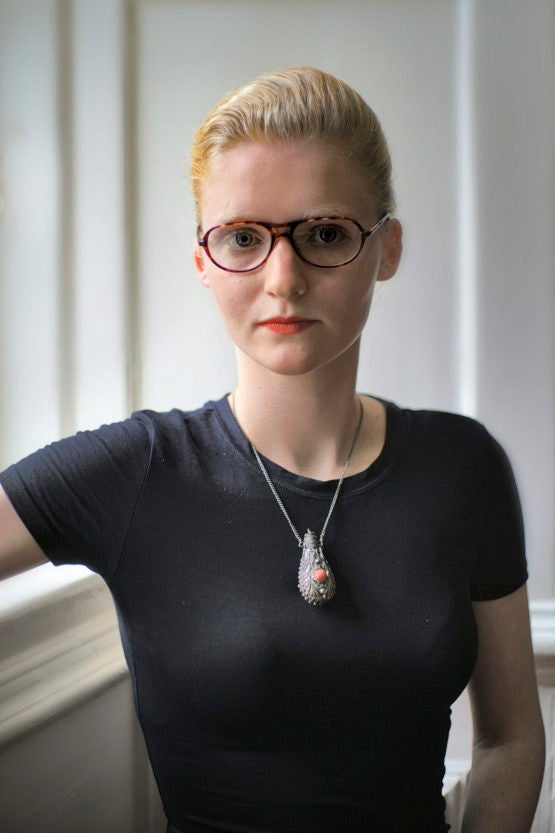Stanford senior digitally documents Voltaire’s research process
Stanford undergraduate Lena Zlock is developing a first-ever digital humanities study of Voltaire’s personal library, which contains over 6,700 books. She aims to make the library’s contents easily accessible and searchable online.
Lena Zlock became intrigued by using digital tools for humanities research since she first heard of data science methods like visual mapping and machine learning in high school.

Stanford student Lena Zlock is developing the first-ever digital exploration of philosopher Voltaire’s personal library, which is housed in St. Petersburg, Russia. (Image credit: Michal Krenz)
So when as a Stanford sophomore Zlock learned that the library of 18th-century French philosopher Voltaire sits largely unexamined inside the walls of the Hermitage Palace in St. Petersburg, Russia, she wanted to find a way to make it easily available on the internet to everyone. Zlock was immediately convinced that the digital technologies she was passionate about could help accomplish this.
For the past two years, Zlock has spent countless hours outside of class developing the first-ever digital exploration of Voltaire’s personal library, called the Voltaire Library Project.
“My goal is to create a three-dimensional portrait of Voltaire’s mind,” said Zlock, now a senior who is double-majoring in history and French and will be using data from the project to write her history honors thesis. “I’d like to eventually recreate the experience Voltaire had as a researcher in his library.”
Born under the name Francois-Marie Arouet, Voltaire was a famous writer and public activist whose ideas about freedom of speech and religion still resonate today. According to historians and scholars, Voltaire’s writings played a major role during the Enlightenment, an intellectual and philosophical movement that dominated Europe during the 18th century.
“By immersing ourselves in the laboratory of Voltaire’s thoughts, we can gain new insights into this star of Enlightenment,” Zlock said.
Zlock hopes to produce a digital, publicly available database that lists extensive information about each one of the more than 6,700 books Voltaire used for his research and cited in his writings. Many of the books’ margins also contain Voltaire’s notes, which Zlock wants to make searchable online. She also wants to map the names of the authors in the library to the regions they were from and use other digital techniques to illustrate different information about the books.
Zlock said she was inspired to look into Voltaire’s library after Dan Edelstein, professor of French, told her about it. Russian empress Catherine the Great purchased the library right after the philosopher’s death in 1778, so that’s how the books ended up in Russia.

French philosopher Voltaire’s personal library contained 6,700 books. Empress Catherine of Russia acquired them upon his death in 1778. (Image credit: Engraved by unknown artist and published in Meyers Konversations-Lexikon, Germany, 1859. / Getty Images)
“Making Voltaire’s collection of thousands of books easily accessible online would be a remarkable resource,” said Edelstein, who is also the chair of the Division of Literatures, Cultures and Languages. “Scholars of the 18th century, those who cite Voltaire’s work today and many other researchers would greatly benefit from getting a bird’s-eye view of his library: What disciplines did his books cover? What were the different languages he was reading? Which time periods did the authors that he collected belong to?”
The list of book titles in Voltaire’s library is currently archived in a 1961 Russian catalog, a copy of which is at Stanford’s Green Library. Zlock is using this resource to jumpstart her project.
Edelstein said he had to sift through the catalog as part of his own research on Voltaire. But using it requires knowing Russian, French and other languages because every title of the book is written in its original language.
Zlock, who is Russian American, speaks Russian and studied French. She said the first part of her project required figuring out the organization of the 1961 catalog, which is written in highly technical Russian. She then spent a lot of time thinking about how to best format her database.
“When I first heard about Lena’s project, my immediate reaction was that it is crazy ambitious and a brilliant idea,” said Mark Algee-Hewitt, assistant professor of English. “Just the catalog of Voltaire’s library alone is a huge, unruly dataset. And transferring it to a digital format is a whole other exercise.”
Algee-Hewitt said he remembers cautioning Zlock about the vastness of her research in spring 2017, when she took his class on literary text mining, a course that teaches students methods for computational analysis of texts. Algee-Hewitt specializes in digital and quantitative analysis of literature and directs the Stanford Literary Lab, a collaborative collective that uses digital techniques to study literature.
“Voltaire is one of those people that everyone has written about,” Algee-Hewitt said. “But Lena has an entirely new angle that’s deeply material and manual. She is basically tackling a very serious bibliographical book history project that will attract all sorts of attention around the world once it’s complete.”
Zlock’s research has been so far supported by an Undergraduate Advising and Research Major Grant as well as a Chappell Lougee Scholarship, which is designed for sophomores pursuing in-depth projects in the humanities, creative arts and qualitative social sciences. This past summer, Zlock used one of the grants to travel to England and work as the first researcher at the Voltaire Lab, a newly created initiative at the University of Oxford’s Voltaire Foundation.
Right now, most of the remaining work on the project involves painstaking data entry and double-checking the information being entered, Zlock said.
“I didn’t realize just how complicated entering things into a spreadsheet could be,” Zlock said. “You have to be extremely meticulous.”
But once the database is finished, which Zlock plans to occur in 2019, the possibilities for insight into Voltaire’s influences are immense. That’s what keeps Zlock motivated through the last hurdles of finalizing the project.
“Digital tools have the power to bring humanities research to a broader audience,” Zlock said. “People now can see medieval manuscripts from their laptop. This digitization of materials breaks down interdisciplinary boundaries. And I believe it’s in the collaboration of disciplines that challenging, tougher questions emerge.”
